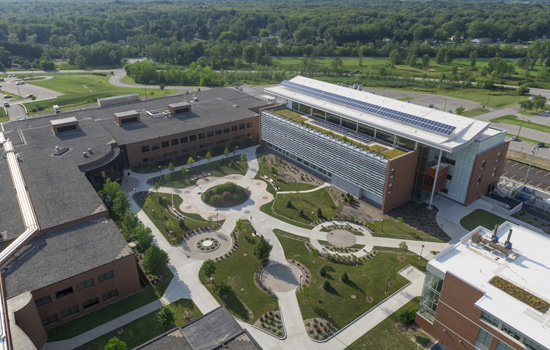RIT hosting two major remanufacturing conferences
Golisano Institute for Sustainability bringing together global network of ‘reman’ leaders
Elizabeth Lamark/RIT Production Services
RIT’s Golisano Institute for Sustainability and Center for Integrated Manufacturing Studies are hosting some of the world’s leading experts from the remanufacturing industry for two conferences Sept. 24-26.
Rochester Institute of Technology is hosting some of the leading experts from the remanufacturing industry Sept. 24 to 26, as leading scientists, engineers and other specialists from across the globe gather on campus for two conferences.
The Golisano Institute for Sustainability (GIS) and the Motor & Equipment Remanufacturers Association are co-hosting a remanufacturing and sustainability conference on Sept. 24 titled, “Remanufacturing and the Circular Economy,” a generic term for an industrial economy that is designed to becoming more restorative in its relationship with the environment.
GIS will then host the third annual World Remanufacturing Summit Sept. 25 to 26, uniting experts from industry and academia in a symposium designed to meet remanufacturing’s challenges and opportunities.
Both conferences will take place inside RIT’s world-class GIS facility and the Center for Integrated Manufacturing Studies at Louise M. Slaughter Hall.
“RIT is proud to host such an impressive assembly of some of the world’s highest-level experts on sustainability and remanufacturing with these back-to-back conferences,” said Nabil Nasr, associate provost, director of GIS and a world leading expert on sustainability and remanufacturing. “Remanufacturing continues to have the potential to reduce the environmental footprint of manufacturing and is widely seen as one of the leading strategies to promote sustainable manufacturing.”
Nasr is the founder of the Center for Remanufacturing and Resource Recovery at RIT, which has become a source of applied research and solutions in remanufacturing technologies. He noted that “researchers and today’s policymakers are becoming increasingly interested in more accurately quantifying the environmental benefits of remanufacturing.”
In addition to Nasr, confirmed speakers for the summit will include (among others):
- Mark Buckley, vice president, Environmental Affairs, Staples Inc.
- Odd Joergenrud, regional president, Automotive Aftermarket North America, Robert Bosch LLC
- Duncan Niederauer, former chief executive, NYSE Euronext
- Paul Traub, business economist, Federal Reserve Bank of Chicago
- Dr. Sheng Zhu, director, National Key Laboratory for Remanufacturing, China
- Ed Daniels, energy engineering and systems analysis, Argonne National Laboratory in Illinois
- Professor Erik Sundin, Linköping University in Sweden.
Presentation topics at the RIT summit will include the use of additive manufacturing technologies in remanufacturing, sustainability in remanufacturing operations, and remanufacturing innovations and future trends.
Nasr presented an in-depth analysis and assessment of remanufacturing’s environmental and energy benefits at the second World Remanufacturing Summit in Shanghai last year. He’s also a member of the United Nations Environment Program International Resource Panel, comprising international experts working on issues that include sustainable consumption and production, socio-economic policies and trade. The international expert panel guides the U.N. on its environmental priorities as well as opportunities for cooperation between governmental and non-governmental initiatives.
Remanufacturing is an industrial process that restores worn and discarded products to a like-new condition. The restoration is a high-quality process through which products are systematically disassembled, cleaned and inspected for wear. Damaged components are replaced, feature upgrades can be incorporated, and the product is reassembled. Reliability testing is performed to ensure performance meets specifications.
Remanufacturing is being increasingly recognized as a necessary step toward a sustainable “closed-loop” low-waste economy and an efficient method for capturing 85 percent of the materials and the labor, energy and manufacturing processes embodied in original products.
According to Nasr, current U.S. remanufacturing industrial activity encompasses thousands of product categories, including aerospace, automotive, construction equipment, medical equipment and electronic products.
Go to the MERA website to learn more about the remanufacturing and sustainability conference, for more information on the World Remanufacturing Summit.







